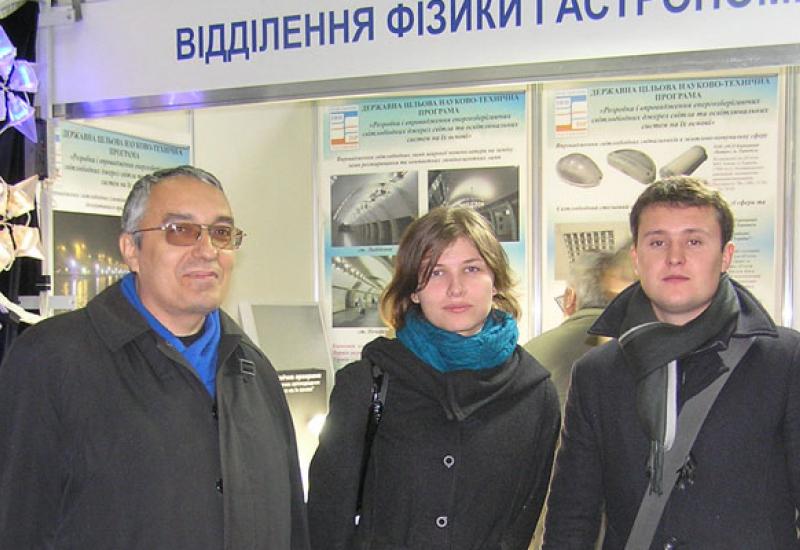According to Development Program of NTUU “KPI” for the 2012-2020 year period, an Energy Efficiency Program for the Institute of Energy Saving and Energy Management (IESEM) was first developed. The strategic concepts of NTUU “KPI” development state that: “The important task for the KPI will be a throughout rebuilding of the energy supply, energy consumption and infrastructure maintenance system”. It is also stated that “the university has to decrease spending for 1 square meter, which it spends on maintenance and energy supply, at least twice”.
The program, created according to the ISO 50001:2011 “Energy Management Systems” international standard, will make it possible to implement its requirements in NTUU “KPI”.
The program was presented and approved at the IESEM Science Council session on December 9, 2013. The program developers are Professor S.P. Denisyuk, IESEM Director and doctor of technical sciences, O.O. Zakladnyi, docent of the Electrical Supply Department and a candidate of technical sciences, and I.Y. Bilous, assistant of the Thermal Engineering and Energy Saving Department. The program defines and approves the energy policy – emphasizing the priority put on energy saving, and the list of certain planned measures of increasing Building 22's energy efficiency.
The goal of the development is: 1) developing a complex approach to decreasing energy consumption by way of implementing energy-saving measures; 2) assisting energy saving development in educational institutions and in Ukraine in general by implementing energy efficient and energy saving materials into educational process, popularizing economic and ecological benefits of energy saving, formulating an energy saving worldview among students, teachers and staff; 3) intensifying scientific developments aimed at increasing energy efficiency; 4) decreasing greenhouse gas emissions by way of decreasing energy resources consumption.
The regulations of the European Parliament and Council Directive 2010/31/EU from May 19, 2010 on building energy efficiency, “Methodics of Energy Audit of Educational Institutions. General Terms. Order of Audit”, Methods of evaluating the decrease of greenhouse gases during building sanation, state construction norms, and materials of the Energy Audit Report for NTUU “KPI” Building 22, carried out by the experts from the Institute of Energy Saving and Energy Management, were used in the development. Generalized analysis of existing experience of foreign nations, domestic and foreign cities and universities, was conducted before the program development.
The program is unique in that it has a practical application. Introducing measures under the program will allow for decreased spending on energy and will create comfortable conditions in education areas.
According to the principles of management, three main branches were developed: educational, scientific and technical.
In order to formulate a conscious attitude to the problems of energy saving among NTUU “KPI” students and staff, among personnel of institutions linked to using fuel and energy resources, and in society in general, the IESEM is developing informational and education measures in support of the energy-saving activities. Among them are lessons to be held with Building 22's students and teaching staff, concerning increased energy efficiency; integration of developed educational methods on energy-saving and increasing energy efficiency in most subjects; training of the teaching staff and engineering staff on training courses; creating mobile training courses on energy-saving and increasing energy efficiency for managerial staff linked to energy, economical and ecological problems; holding all-Ukrainian competitions on energy-saving and energy efficiency, etc.
The scientific branch, with the purpose of spreading energy-efficient technologies developed by the IESEM, gives information on developments IESEM offers in the field of energy saving, lists scientific events organized by IESEM, for example, international conferences, scientific publications, science training, etc. The technical branch analyzes the status of energy consumption and energy usage in the institute building, gives results of the heat, water and electrical supply systems' energy audit, and offers a development of heat and electricity balances for building 22. The program includes a wide assortment of economically justified energy-saving measures, divided into three groups – organizational, low-cost and primary. The primary measures include setting up heating units and weather-specific heat generation control automatics, heating systems flushing, installation of energy-saving lighting, radiator deflectors and removal of radiator decorations. Therefore, the program is, practically, a working plan for reaching high energy efficiency.
The program is the result of the university administration's rational energy consumption policy, and utilizes the Schuhart-Deming «Plan-Do-Check-Act» cycle for quality control, in accordance to ISO 50001 standard; this allows for systematic effective energy consumption control and to continuously improve energy management activities at IEE NTUU “KPI”.
The Building 22 energy efficience program may become typical for other NTUU “KPI” buildings, which would involve its duplication with the specifics of each separate building in mind, and would involve using it as an important element in a possible certification of the university energy management service for accordance with ISO 50001.
The program is a self-sufficient strategy of energy-saving actions, with its key feature being that its execution would allow for realization of a systematic approach to gradual energy supply improvement, increased energy efficiency level, comfort and the ecological situation.
O.O. Zakladnyi, candidate of technical sciences, docent of Energy Supply Department of IESEM
Translator: Нікіта Соловйов ЛА-11

